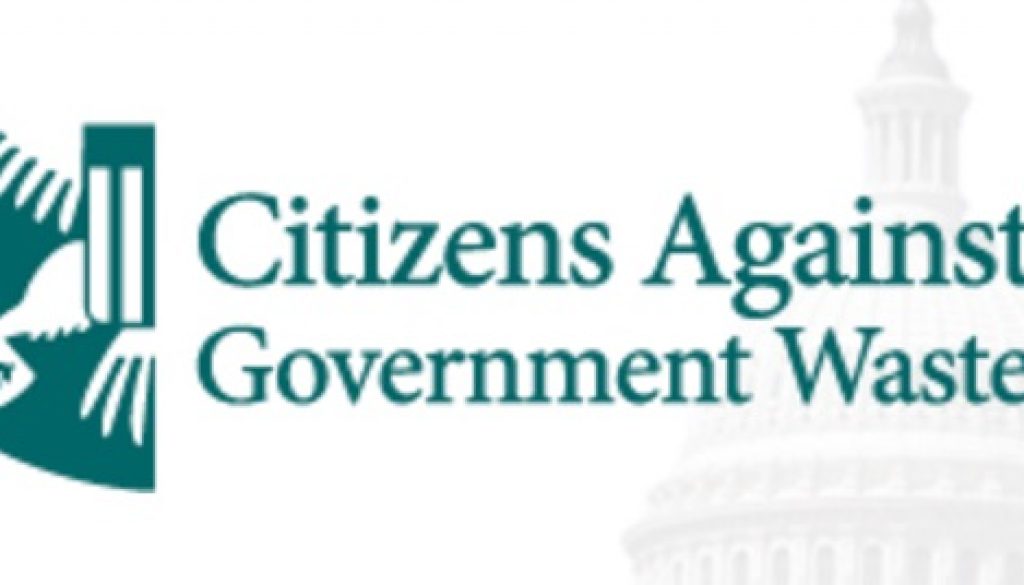Citizens Against Government Waste releases 2019 Congressional Pig Book exposing the worst waste in Washington!
(Washington, D.C.) – Citizens Against Government Waste (CAGW) released its 2019 Congressional Pig Book, the 27th edition of the group’s exposé on pork-barrel spending. CAGW President Tom Schatz was joined at the Phoenix Park Hotel in Washington, D.C. by Sens. Rand Paul (R-Ky.), Ben Sasse (R-Neb.), and Reps. Ted Budd (R-N.C.), Tim Burchett (R-Tenn.), Bill Flores (R-Texas), and Rep. Tom McClintock (R-Calif.). Also in attendance was a live pot-bellied pig named Faye from Richmond, Virginia. Examples:
- $1.8 billion for seven earmarks for the F-35 Joint Strike Fighter, including eight additional planes for the Air Force, six for the Navy, and two for the Marine Corps. In development for nearly 18 years and eight years behind schedule, total acquisition costs now exceed $428 billion, nearly double the initial estimate of $233 billion. A 2019 DOD Selected Acquisition Report noted that the F-35’s lifetime operation and maintenance costs will total approximately $1.2 trillion, the most expensive weapon system in U.S. history.
- $65 million for the Pacific Coastal Salmon Recovery Fund. For the third consecutive year, President Trump’s budget recommended eliminating its funding because it favors state, local, and/or industry interests, and are “not optimally targeted … favor certain species and geographic areas over others,” and do not direct funds to programs and projects that have “the greatest need or potential benefit.”
- $13.8 million for wild horse and burro management (largest amount ever). Since FY 1992, legislators have added $18 million in earmarks for wild horse and burro management.
- $12 million for the aquatic plant control program (largest amount ever). Since FY 1994, aquatic plant control projects have been earmarked by Sen. Minority Leader Chuck Schumer (D-N.Y.), Sen. Patrick Leahy (D-Vt.), and then-Sen. Jeff Sessions (R-Ala.).
- $9 million for a fruit fly quarantine program. After a 10-year furlough, members of Congress have returned to the trenches in the war against fruit flies. Since FY 1991, members of Congress have added 12 earmarks costing $39.2 million for fruit fly research, eradication, or quarantine.
- $863,000 for a brown tree snake eradication program. The snakes are native to northern Australia, Indonesia, and many of the islands in Melanesia, but were likely introduced in Guam by the U.S. military following World War II.
CAGW President Tom Schatz said in a statement: “The 2019 Congressional Pig Book reveals that Washington has the pork-barrel fever, and their only prescription is more earmarks. Dozens of members of Congress from both parties are publicly and privately lobbying for this wasteful and corrupt practice to return. Pushing pork does not drain the swamp and it won’t restore integrity to Washington. One of the best ways to clean up Washington’s addiction to waste is for Congress to enact a permanent, statutory ban on earmarks.”
Citizens Against Government Waste is the nation’s largest nonpartisan, nonprofit organization dedicated to eliminating waste, fraud, abuse, and mismanagement in government.
2019 Congressional Pig Book facts:
- The 2019 Congressional Pig Book exposes 282 earmarks in FY 2019, (21.6 increase from FY 2018) costing taxpayers $15.3 billion (4.1 percent increase from FY 2018).
- The $15.3 billion in FY 2019 earmarks is the largest amount since FY 2010.
- For the seventh time since Congress enacted an earmark “moratorium” in fiscal year (FY) 2011, CAGW has unearthed earmarks in appropriations bills.
- The increase in pork-barrel spending occurs behind closed doors and hidden from taxpayers. There are no names of legislators attached to each earmark and limited information on where and how the money will be spent.
- Since 1991, Congress has approved 111,144 earmarks costing $359.8 billion.
Would you like copies of the Pig Book for your audience? Let us know by responding with your mailing address so we can send some to you right away!





